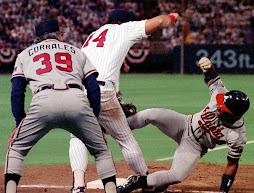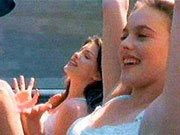COOPERSTOWN, N.Y. -- Rickey Henderson is generally regarded as the greatest leadoff man in Major League Baseball history. He's known as a catalyst, agitator, trailblazer, master thief and one-man wrecking crew in a multiskilled package.
Rickey Henderson will be inducted into the Baseball Hall of Fame along with Jim Rice and Joe Gordon on Sunday starting at 1:30 p.m. ET in Cooperstown, N.Y. Approximately 51 Hall of Famers are scheduled to be in attendance.
At the peak of his game, Henderson could overwhelm teams with his speed, surprise them with his power and unnerve them with his swagger. He also put front-office executives on edge with his contract-related rants and confounded beat reporters with his diction.
Showman. Hot dog. Prima donna. Rickey being Rickey. We've heard them all at one time or another, in both first- and third-person variations.
"Popular teammate" rarely appears in the Rickey's greatest hits lexicon, but the players, managers and coaches who've shared clubhouses with Henderson through the years paint a more layered portrayal than the one that's typically available for public consumption.
Phillies outfielder Raul Ibanez saw the phenomenon nine years ago in Seattle. In 2000, Ibanez was a part-time player trying to gain a foothold with the Mariners at age 28. He spent a big chunk of the season as Henderson's backup, late-inning defensive replacement and all-around caddy.
As the summer progressed, Ibanez came to appreciate an act of generosity by Henderson that went unnoticed by everyone else. More than once upon leaving the game in the seventh or eighth inning, Henderson went to manager Lou Piniella and yielded his final plate appearance of the day to Ibanez.
"Whenever Lou would put me in to give him a [rest] or play defense, Rickey would say, 'Let him get the at-bat,'" Ibanez said. "That was unbelievable. He was a Hall of Famer and I was a young guy coming up, and he treated me like an equal. I loved Rickey Henderson."
Henderson, 50, will enter the Baseball Hall of Fame with former Boston slugger Jim Rice on Sunday in Cooperstown, and there's not enough room on a plaque to do justice to his achievements. Henderson is baseball's career leader with 1,406 stolen bases and 2,295 runs, and ranks second to Barry Bonds with 2,190 walks. His résumé includes a Most Valuable Player Award, 10 All-Star Game appearances, a Gold Glove, 3,055 career hits and the most leadoff homers (81) of any player in history.
Rickey Henderson was a rare combination of power, speed and patience at the top of the lineup.
"He's as legit a Hall of Famer as you want to get," said Piniella, who managed Henderson with the Yankees and Mariners and is currently with the Cubs.
For obvious reasons, Henderson's induction speech is the most eagerly awaited since Bob Uecker did a 15-minute comedy monologue as the Ford C. Frick broadcasting award winner in 2003. Rickey helped ratchet up the anticipation last week when he revealed that he's not much for formal speeches, so he just might wing it in Cooperstown.
"Speech and me don't even get along sometimes, and I wasn't a doctor or a professor," Henderson said during a conference call with reporters. "So me having to go up there and try to write a speech or read a speech, that's kind of like putting a tie on my neck too tight."
So let's cut Henderson some slack on the podium. For those who watched him revolutionize the leadoff spot during his heyday in Oakland and New York, words will always rank a distant second to actions, anyway.
Henderson was cool enough to inspire a generation of would-be Rickeys. The list of hard-core admirers includes Phillies shortstop Jimmy Rollins, who grew up in nearby Alameda, Calif., and regarded a ticket to an Oakland A's game as a mere vehicle to watch Henderson practice his craft.
Rollins would sit in the stands and train his eyes on Henderson from the moment the A's came out for pregame stretching. The style. The flair. The wristbands. It was all so quintessentially Rickey.
"He'd run his sprints, and he didn't say much to anybody," Rollins said. "He had his glasses on, and it was like Rickey was in his own world. He was on the field and it was like, 'This is who I am. This is my domain. I'm Rickey Henderson. I'm gonna steal, I'm gonna hit, I'm gonna hit home runs. This is what I do.' I would watch Rickey and be like, 'What is he thinking?'"
At a compact 5-foot-10 and 195 pounds, Henderson was aggressive, fearless and relentless. Phillies coach Davey Lopes played with Henderson in 1982, the year Rickey set the major league record with 130 stolen bases, and came to regard Henderson as emotionally bulletproof.
If Henderson jammed a finger sliding into second base, he'd get up, dust himself off and steal third. If the opposing pitcher threw a ball under his chin, he would get up, grab the bat and line the next pitch up the middle.
Henderson was caught stealing a record 335 times in his career, but pitchouts, bad calls and perfect throws couldn't dissuade him from running.
"Nothing fazed him," Lopes said. "And when I say nothing, I mean absolutely nothing."
Henderson's on-field theatrics -- from snatch catches to bat flips to accentuated home run trots -- were designed to distract the opposition. But he was a student as well as a showman. If anything riles his supporters, it's the perception that his success was purely the result of God-given ability.
Lopes took offense in Oakland when he watched the media poke fun at Henderson for his fractured syntax. The cartoon Rickey bore little resemblance to the player he knew.
"I saw a lot of that when I was [in Oakland], and I didn't particularly care for it," Lopes said. "I don't think it was fair to him. Rickey may not have had the book knowledge. He wasn't a Harvard graduate. But when he put that uniform on, he was as smart as anybody could be."
Henderson's longevity was extraordinary for a speed guy. He hit .227 for the San Diego Padres in 2001, but still managed to draw 81 walks, score 70 runs and steal 25 bases at age 42. Long after his wheels deserted him, he found a way to get by on the knowledge he had accrued.
"I remember hearing stories that he didn't know his own teammates," Ibanez said. "That's a blatant lie. If a guy came in to pitch, Rickey already knew how that guy tipped his motion toward the plate to get a good jump. If not, he'd figure the guy out in a second. He was supersmart."
Henderson's work ethic was part and parcel of his desire to be the best. Matt Stairs, a teammate with Oakland in 1998, remembers Henderson's arriving early each morning at spring training and running barefoot on the grass, foul line to foul line, while the other A's were in the clubhouse grabbing that first donut or cup of coffee.
Henderson's competitive drive and love of baseball prompted him to hang on too long at the end. But he never tired of the camaraderie, and he could shake the clubhouse with his laugh.
"Rickey loved to talk trash, in a good way, but he could also take it," Stairs said. "He could play cards, too. He would get the young kids to play and take their money."
Former teammates remember Henderson's gravitating to the younger players. He took Mike Cameron and Charles Gipson under his wing in Seattle and tried to teach them the art of stealing bases. Maybe the kids helped keep him young, or he just liked the thought of playing mentor.
It's funny how baseball keeps bringing him back full circle. In the summer of 1976, Henderson played in a California high school All-Star Game in Anaheim. He was part of the North team roster, and the South squad featured a talented young shortstop named Alan Trammell.
"He led off the game with a double," Trammell said. "We had a scouting report on Rickey, so on the first pitch we did an inside move and picked him off second."
In 2001, Trammell was a coach in San Diego, and Henderson notched career hit No. 3,000 with the Padres that season. In their limited time together, Trammell saw a side of Rickey that he never could have discerned from crowding the second base bag.
"He never complained once when he didn't play, and the young players loved him," Trammell said. "He was just a regular guy there. I saw that firsthand."
Sunday afternoon in Cooperstown, come rain or shine, Rickey Henderson will stand on a stage with Rice and 50 other baseball immortals and accept his plaque. He's a Hall of Famer now, and he'll never have the luxury of being "regular" again.
Friday, July 24, 2009
By Jerry Crasnick
Subscribe to:
Post Comments (Atom)










.jpg)

































No comments:
Post a Comment